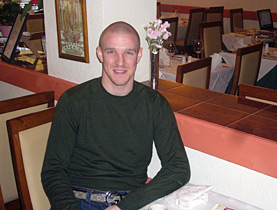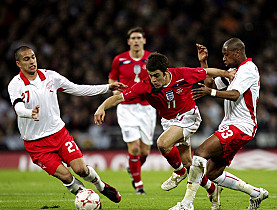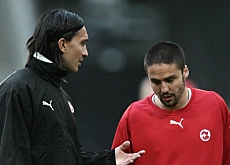Philippe Senderos

Arsenal and Swiss national team defender Philippe Senderos remains a down-to-earth character despite playing in one of the world's richest football leagues.
The 23-year-old is seen as an example of successful integration, demonstrating that your roots may begin to define you but it is where you feel at home that puts the finishing touches to your personality.
His father was born in Spain, his mother in Serbia. They met in Geneva and decided to spend their life there. Their two sons are Swiss, even if they are well aware of their origins.
“I know I have Spanish and Serb blood. I even have a Spanish passport, but I am Swiss,” Senderos told swissinfo.
“It’s my country, my roots, and my parents always made sure I understood that.”
Sitting in a small restaurant in northern London, a few minutes after finishing a training session, he is almost apologetic for turning up late.
He doesn’t seem anything like the tough, disciplined character that most people describe as taciturn and hard to reach. His short hair and athletic build have probably contributed to his reputation.
“People who know me realise that I’m not a grim character all day long. But it’s true that my position on the pitch means I have to be on top of my adversary and get some respect,” he said.
“I know I have a reputation as a tough guy, but I can’t spend my time smiling for the photographers.”
Experience
But the difference between his on-field and off-field personas is no problem for Senderos, and on the pitch he now has a reputation to defend. Despite his young age, his qualities are recognised at Arsenal and within the Swiss squad.
He has been on public view for so long that he could almost be considered a veteran.
He has certainly made an impact over the years. Many television viewers remember his bloody face after scoring a goal against South Korea at the 2006 World Cup.
He moved up the ranks quickly, making the jump from Geneva’s Servette club to Arsenal, opening the doors to the Champions’ League, the national squad, the World Cup and soon Euro 08.
Along the way, he has gained plenty of experience.
“I had to work hard to get where I have,” he admits. “I have some qualities, but I’m not the most talented player. What I have shown is great heart, discipline and work ethic.”
Senderos is a player who needs a regular lifestyle. Chances are you won’t see him on the frontpage of a tabloid.
“Sport at the level I’m playing isn’t always good for your health,” he says. “We have matches every three days so not recuperating is dangerous.”
New life and culture
But he adds that his lifestyle is also a reflection of his education and desire to keep a firm grasp on where his life is headed.
Over the past five years that life has changed dramatically. Today Senderos is nothing like the wide-eyed player who joined Arsenal under the spell of English football and French manager Arsène Wenger.
“When you join a club like Arsenal as a young player, you realise pretty quickly that you won’t get a chance if you don’t work hard,” he says. Looking back at his time with Arsenal, he now realises that the injuries he suffered after arriving gave him time to settle into a new life and culture.
Today Senderos feels at home in London, even though he is still proud of his Geneva roots and that most of his friends and family live there.
It’s there that he heads when he wants to take a break from football. He also sometimes travels to Spain to see his cousins in Madrid and the tiny village his father came from near Guadalajara, a long way from the British capital.
swissinfo-interview: Mathias Froidevaux in London
Senderos was born in Geneva in 1985.
After playing for Geneva’s Servette club from 2001 to 2003, he moved to Arsenal, playing his first Premier League game in 2004.
The central defender was a member of the Swiss side that won the European under-17 championship in 2002.
He joined the national squad in 2005 for a first game against France. Since then, he has been selected 24 times and scored three goals.
He was part of the Swiss team that took part in the 2006 World Cup.
Arsenal were founded in 1886 by workers from the Royal Arsenal in Woolwich.
The club has won the championship 13 times and won the FA Cup ten times. At the European level, Arsenal won the Cup Winners’ Cup in 1994 and the Uefa Cup in 1970.
In 2006 the team came close to winning the Champions’ League, losing to Barcelona in the final.
Frenchman Arsène Wenger has managed Arsenal for the past ten years.

In compliance with the JTI standards
More: SWI swissinfo.ch certified by the Journalism Trust Initiative


You can find an overview of ongoing debates with our journalists here. Please join us!
If you want to start a conversation about a topic raised in this article or want to report factual errors, email us at english@swissinfo.ch.